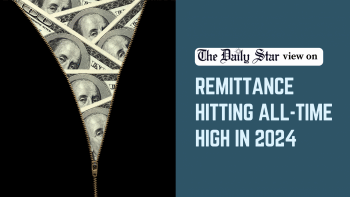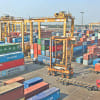The new year through my lenses

As I write this column, my first in 2025, I feel optimistic, whichever lens, whether economic, political, or geopolitical, that I use to view the prospects for this year. The outlook, on a scale of 0-10, is almost a 7, which means I see signs that our nation will be able to overcome the remnants of the storm we overcame last year. While I cannot claim that I can see with 20/20 clarity how events this year will turn out, I am confident it will be way better than the nightmare we overcame in August.
I jokingly told my 88-year-old mother-in-law, while I cannot forecast with 100 percent accuracy whether the prices of essential items in the kitchen market will come down, or all her bank accounts will be fully restored, the vibes all indicate that as the year progresses, things are heading in the right direction. However, political uncertainty in Bangladesh could lead to downward pressure on the country's rating. And, prolonged political violence or policy paralysis could exacerbate fiscal or external stresses, but only slightly.
To reiterate, the year 2025 revives for us hopes for a better future. Like many of you, I feel that the new year will bring about a true change, in our political system and everyday life. The masses in the country wanted a clear break from the past decade, and the July uprising delivered a deliverance of sorts.
Now let us turn to the matter at hand. The economy, the institutions, and the moral fabric of our society were left in shambles by the previous regime, whose chief sought refuge in India, with our coffers empty, the civil service demoralised, and the masses angry and frustrated. Admittedly, things have calmed down, and while we can look forward to a brighter and less mangled socioeconomic system, the new year will be a time for vigilance, and renewed determination to rebuild the nation to take it to a higher level where it deserves to be and make up for the lost time.
For the world as a whole, the OECD is predicting 3.3 percent economic growth for 2025. That's higher than the past few years. Inflation is trending lower, and despite the heightened risk of a trade war, interest rates can be expected to be heading downwards. Because we're seeing lower levels of inflation, that will lead to lower interest rates, which can only bring in higher levels of demand and spending.
We need to bear in mind that the economy might appear a little different depending on where in the world you are located. While the US has grown relatively fast in recent times, other developed countries have grown slower. Inflation has come down in the Eurozone area, but GDP growth will continue to be slow this year because of a slowdown in the manufacturing sectors. In addition to that, the ongoing structural issue of monetary policy in the Eurozone persists. Monetary policy is difficult because of diverse economic situations across different member states due to the single currency—that means that a policy that might be appropriate for one country could be too tight or too loose for another, leading to potential imbalances and economic disparities within the Eurozone.
China is expected to bounce back from the slow growth it experienced last year. Their government recently passed fiscal and monetary stimulus to enhance growth in 2025, and this will provide a boost to its economy—the ripple effects will be felt elsewhere too. On the other hand, while we wait for the new US administration to formulate its threatened higher tariff barriers against China, as well as the rest of the world, the impact on China's exports and the economy might take a few months to manifest. At this point, I can only add, "let us wait and see."
According to the World Bank, the poorest countries are in their worst economic state for two decades, having missed out on the post-pandemic recovery. For many other economies, the prospect of a stronger dollar is bad news. That would suck investment away from them and make their dollar-denominated debt dearer. Also, if Trump's tax cuts or higher tariffs create inflation and slow the pace of Federal Reserve rate cuts, that could be bad for the borrower nations.
The Asian Development Bank, on the other hand, revised the region's inflation forecast for 2024 and 2025 as price pressures ease due to the lagging effects of monetary tightening.
Inflation in "developing Asia"—which comprises 46 members of the ADB, such as China and India—is now forecasted at 2.7 percent this year, slightly slower than the projection in July, according to the December 2024 Asian Development Outlook. For 2025, the outlook was revised downward from 3 percent to 2.6 percent.
According to the latest economic analyses, Bangladesh's economy is projected to improve in 2025 due to anticipated positive factors like inflation control, banking sector reforms, increased domestic resource mobilisation, a better business climate, and expanded trade. The two recent floods have disrupted this year's Aman production. Nonetheless, there are reasons to believe that the pro-active steps taken by the interim administration will bridge the gap between last year's production and this year's expected harvest.
Even though some concerns remain regarding political stability and public order, many business leaders are expressing optimism about earnings growth if the economic reforms are implemented successfully.
Key reasons for potential economic improvement in Bangladesh in 2025 are the RMG sector's resilience, growth in the digital economy, and the focus of the interim government on improving the business environment, tackling corruption, and facilitating foreign direct investment. Nonetheless, the government will need to be vigilant about the youth unemployment situation, the cost of borrowing, exchange rate oscillations, and the terms of trade.
I am betting that inflation globally will slow down, the bellicosity levels in Ukraine and the Middle East will die down, and the forthcoming elections in Bangladesh will be a harbinger of good times ahead. I cannot but add that I was thrilled to note that the prestigious British magazine, The Economist, recognised Bangladesh as the "Country of the Year" in 2024 for toppling an autocratic regime in an unprecedented student-led mass uprising. I look forward to further inspirational happenings in the coming months.
Dr Abdullah Shibli is an economist and works for Change Healthcare, Inc., an information technology company. He also serves as senior research fellow at the US-based International Sustainable Development Institute (ISDI).
Views expressed in this article are the author's own.
Follow The Daily Star Opinion on Facebook for the latest opinions, commentaries, and analyses by experts and professionals. To contribute your article or letter to The Daily Star Opinion, see our submission guidelines.

 For all latest news, follow The Daily Star's Google News channel.
For all latest news, follow The Daily Star's Google News channel. 










Comments